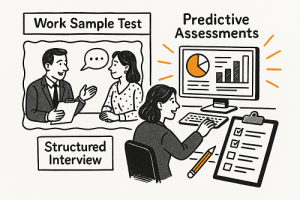We’ve all been there: a candidate is charming and confident. The conversation flows effortlessly, you build a great rapport, and they leave you with a strong, positive “gut feeling.” They get the job. Six months later, performance is lagging, team dynamics are strained, and you’re left wondering, “How did I get that so wrong?”
The hard truth is that the traditional, unstructured interview—while comfortable and familiar—is one of the least reliable predictors of on-the-job success. It is highly susceptible to unconscious biases and often measures a candidate’s interview skills rather than their actual competence.
Progressive, data-driven organizations are now making a fundamental shift. They are moving away from intuition-based hiring and embracing a more scientific, evidence-based approach. The future of building elite teams lies in predictive, engaging, and equitable assessment methods that measure what truly matters.
The unreliable nature of “good conversation”
For decades, the unstructured interview has been the cornerstone of recruitment, yet study after study has shown its flaws. Why? Because we are all human, and our brains take mental shortcuts that create bias:
- The halo/horns effect: our first impression (positive or negative) colours our perception of everything else the candidate says.
- Confirmation bias: we spend the interview seeking evidence to confirm our initial impression, ignoring contradictory information.
- “Similar-to-me” bias: we naturally gravitate towards people who share our background, interests, or communication style, regardless of their qualifications for the role.
These biases mean we often hire people who are like us or who are good at interviews, not necessarily the people who will perform best in the job.
A new toolkit: the rise of predictive assessments
Evidence-based hiring seeks to replace subjectivity with objective data. This involves using a combination of tools designed to measure actual, job-relevant skills and competencies. The most effective methods include:
- Work sample tests: considered the gold standard in predictive hiring. Candidates are asked to perform tasks that are a direct sample of the work required (e.g., a coder is asked to debug code, a marketer is asked to draft a campaign brief).
- Situational judgment tests: presenting candidates with realistic, work-related scenarios and asking them to choose the best course of action. This assesses problem-solving, decision-making, and alignment with company values.
- Structured interviews: a powerful upgrade to the traditional chat. All candidates are asked the same set of pre-determined, job-related questions, and their answers are scored against a standardized rubric. This ensures fairness and allows for direct, apples-to-apples comparisons.
The language skills challenge
Nowhere is the failure of traditional interviews more apparent than in assessing language skills. A simple “Do you speak German?” in an interview is almost useless. A 15-minute chat can’t reveal if a candidate can:
- Handle a complex customer support call with an angry client.
- Write a precise, error-free technical report.
- Negotiate the nuanced terms of a business contract.
This is where a professional, third-party skills audit fits perfectly into the modern assessment model. Instead of a subjective conversation, a standardized language assessment provides objective data on a candidate’s actual ability to perform job-specific linguistic tasks. It moves from “I think they can speak the language” to “I have evidence they possess the C1-level writing skills required for this role.”
Engaging candidates, not interrogating them
A common fear is that this new approach is cold, robotic, and will damage the candidate experience. The opposite is true. When designed correctly, modern assessments are highly engaging:
- They offer a realistic job preview: candidates get a real feel for the work they would be doing, helping them make a more informed decision.
- They feel fair and relevant: candidates appreciate a process based on their actual skills rather than on subjective personality judgments.
- They demonstrate professionalism: a well-structured assessment process signals that your company is serious, professional, and invests in making quality hires.
How to rethink your hiring process
Transitioning to an evidence-based model is a deliberate process:
- Define “good” before you start: work with stakeholders to build a detailed success profile for each role. Focus on the essential skills and competencies needed, not vague personality traits.
- Choose the right tools for the job: select a combination of assessments that measure the key competencies you’ve identified. There is no single magic bullet.
- Train your team: ensure recruiters and hiring managers are trained on how to conduct structured interviews and how to interpret assessment data without letting their biases creep back in.
- Trust the data: foster a culture where objective evidence is valued alongside, and often above, subjective “gut feelings.”
Building teams with confidence
The shift from subjective conversations to objective evidence is the single most important evolution in modern talent acquisition. By rethinking outdated interview techniques and embracing predictive assessments, you are not just improving your quality of hire. You are building a fairer, more equitable, and more effective process that gives your organization the confidence to assemble truly high-performing teams.
Are you ready to move beyond gut feeling and build a truly evidence-based hiring process?
Objective skills assessment is the cornerstone of modern, predictive recruitment. Focus Audit Tool provides standardized, expert language audits that give you the reliable data you need to make confident hiring decisions for your international roles. Replace guesswork with evidence and ensure your next hire is the right one.






